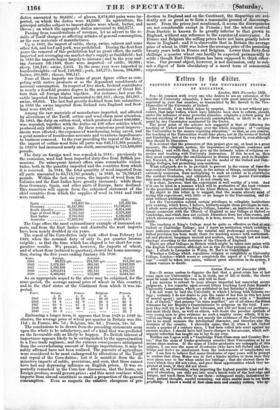!ditto to 4t suitor.
PROPOSED EXTENSION OF THE UNIVERSITY SYSTEM • • OF ED17CATION.
London, 30th November 1850.
Sin—In common with every one who desires to see an extension of the benefits of University education, I have read with great interest the papers reprinted in. your last number, as transmitted by Mr. Sewell to the Chancellor:of the University of Oxford.
Like yourself, I am indeed taken by surprise. But it is not without pre- cedent, that large bodies, which have hitherto been slow to reform, should, under the influence of some powerful stimulus, originate a reform going far beyond anything of the kind previously contemplated, or likely to be pro- posed by any Commission nominated by the Crown. The great point of the scheme now suggested is that of diffusing the teaching of Oxford and Cambridge over the whole kingdom ; of "carrying the Universities to the masses requiring education," so that, as you observe, the teaching of the Universities would take place, not in the towns of Oxford and Cambridge, but at the very doors of those who required it, even although they should be Dissenters.
It is evident that the promoters of this project give up, at least in a great measure, the collegiate system, the importance of collegiate residence and discipline; and with that, they give up the intimate union of religious ex- ercises and teaching with University instruction. If this be not so, then they must contemplate the establishment in distant towns, such as Manches- ter, Norwich, &e. of Colleges formed on the model of the Oxford and Cam- bridge Colleges, but permitting non-residence. What safeguards are to be provided to prevent in the course of time the non-resident Graduates, who must, in the nature of things, certainly become extremely numerous, from multiplying to such an extent as to overwhelm the resident Graduates, and ultimately to convert the parent Universities into mere degree-giving bodies, I do not clearly see.
It is clear, however, that the experiment is well worthy of a trial. And if it can be tried in a manner which will be productive of the least violence to the prejudices and interests of the Alma) Matrtm, so much the better.
My object in this letter is to suggest, that the means already exiat of trying this experiment, with little or no danger to the Universities, and al- most without additional expense. Let the Universities extend certain privileges to collegiate institutions now existing, which have, I believe, hitherto sought these privileges in vain. I allude more particularly to King's College, London ; an institution in as in- timate connexion with the Church of England as any Colle,ge at Oxford or Cambridge, and which does not exclude Dissenters from her class-rooms, and which encourages residence, within, it is true, narrow, but not inextensible limits.
The teaching at King's College must be quite as effective as that at any Oxford or Cambridge College ; and I know no institution which exhibits a more judicious combination of the tutorial and professorial systems. The fullest provision has been made there for teaching science both mathemati- cal and physical, languages ancient and modern, and, though last not least, theology according to the doctrines of the Church of England. There are other Colleges in Britain which might be taken into union with the English Universities, although not so ripe for that purpose as King's Col- lege : I allude to Lampeter in Wales, St. Bee's in Cumberland.
Whether a College which repudiates religion so completely as University College, London—which wears so completely the aspect of "Godless Col- lege "—could be taken into union, without great alteration in its system, I
























 Previous page
Previous page